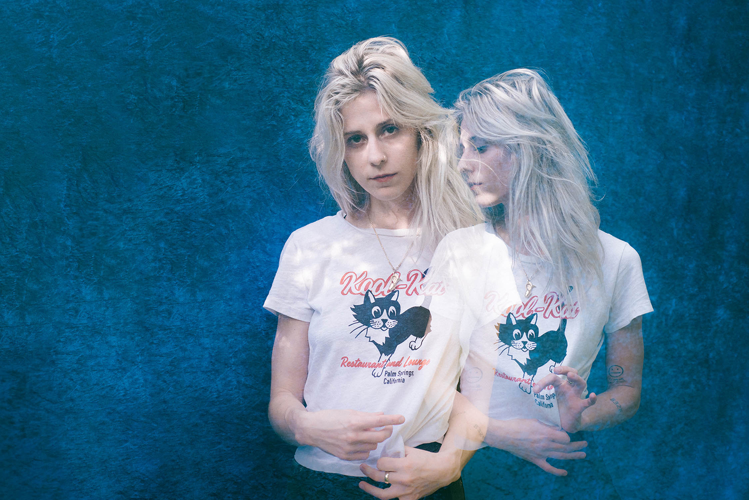
There is an exact moment on Bully’s new record Sugaregg, out Friday via Sub Pop, when everything clicks into place. Partway through “Hours and Hours,” the penultimate track, Alicia Bognanno sings with a gentle insistence, “I’m not angry anymore / I’m not holding on to that.”
Her voice cuts through the ethereal cloud of guitar feedback that’s been gathering over a rubbery bass line. She repeats the line again, a little louder, as all the sonic stars collide for the climax. At the end of the song, the words hang in the air before slowly fading away, like Bognanno is trying to remind us that we too can all let go of our anger — if we want to, if we’re willing.
The song, and the idea of letting shit go, is a notable pivot from past Bognanno joints. On 2017’s Losing, when Bully was a trio rounded out by bassist Reece Lazarus and guitarist Clayton Parker, Boganno was tired, pissed and restless. The keys to America had just been handed over to the world’s most dangerous clown. Bognanno — an unapologetic feminist who has carved out a career as a musician, engineer and producer in a male-dominated industry — funneled that collective frustration into the music.
Losing’s songs shine bright with an alt-pop charisma reminiscent of Dinosaur Jr. and The Breeders, but the lyrics cut deep. In “Focused,” Bognanno vows to kill a man should he dare hurt her friend again. In “Hate and Control,” a response to Trump’s presidency, she gives a warning: “You don’t like it when I’m angry? / Tough shit, learn to deal!”
But even more was going on below the surface. Bognanno didn’t talk publicly about it at the time, but she was in the throes of untreated bipolar disorder, and its symptoms were devastating to both her personal and professional life.
“That was in the thick of it, when I was trying to figure it out, going through the different medications, and had no idea what was going on in my body and head,” says Bognanno, speaking about those months when she was writing, recording and promoting Losing. “My paranoia was debilitating. I literally turned down a show because I was paranoid that I was gonna get tomatoes thrown at me. For no reason! … I can’t imagine what my manager had to go through. Any interview that was posted I would pick apart and feel sick to my stomach about for months. I remember feeling like I was burning inside and everything was a battle for me. There was just a shell of me in that record, I think. Not to shit on that record, but that’s what it was.”
Sitting in her backyard, in the shade with her two dogs Mezzi and Papa, Bognanno laughs at how absurd those unfounded fears sound now. No one has ever thrown food at her; she’s never been chased offstage. And she talks openly about how everything changed when she was able to treat her bipolar disorder with a combination of medication, meditation and therapy. But to say it wasn’t easy to get here is an understatement. The music industry — hell, the country — is notoriously unfair to people experiencing mental illness.
Rapper Kanye West was diagnosed with bipolar disorder prior to the release of his 2018 LP Ye. Recently, he unleashed a string of tweets that mentioned everything from his questionable presidential campaign to vaccines being “the mark of the beast,” and his diagnosis became gossip fodder again. Some saw his behavior as a joke. They mocked him and passed around memes. Others tried to diagnose him through their laptops, judging both him and his famous family for his behavior while not so delicately suggesting treatment options.
But receiving treatment can feel like a double-edged sword, especially for emotional artists who rely on life’s highs and lows for inspiration. Our society romanticizes mental illness, from “manic pixie dream girls” to “crazy geniuses.” Many people in creative fields have admitted to avoiding medication or therapy for fear that treatment would annihilate their creative output. Damned if you do, dangerous if you don’t.
“I thought about that, 100 percent,” says Bognanno. “I want to write when something is bothering me or there’s something I need to get out. I was worried if I got to a better place that that would kind of be flattened. But that’s fucking bullshit. I have also talked with people who I admire, and they have said things along the lines of, ‘I don’t want to get treated because I like how much I get done when I’m like this.’ So it was always in the back of my head. But it’s so funny, ’cause now I look back and I’m like, ‘I got a way better record out of feeling better!’ ”

Bognanno’s newfound confidence shines throughout Sugaregg, often in surprising ways. Her no-bullshit attitude is still there — she blatantly rejects traditional gender roles in the single “Every Tradition.” But Bognanno has also finally started to trust her ideas, allowing room for experimentation and nuance within the songs.
“ ‘Let You,’ ‘You,’ ‘Where to Start,’ ‘Hours and Hours’ — those are songs you wouldn’t find on any other Bully records,” she says.
Though Bognanno stepped out of the producer’s chair for this album, she still leaned on her production skills. She crafts a whole universe within “Hours and Hours.” It’s the perfect representation of both her resilience and her determination to chart new territory. It’s stunning.
“I have an electric bow, and if you put it on the [guitar] strings it creates somewhat of a controlled feedback — I used that for a lot of it,” she explains. “I did something with the vocals, like when there’s those ‘ahhhs,’ I ran my vocals through a pedal through a guitar amp and mic’d the guitar amp.”
More experimentation comes by way of an acoustic guitar (and a few dog barks) on the woozy “Come Down.” The layers of vocals in the chorus of the peppy, harmony-heavy “Like Fire” were inspired by some fiddling with a harmonizer pedal and — “This is embarrassing,” Bognanno says with a laugh — that drenched-in-synth-and-vocoder Imogene Heap song “Hide and Seek.” She laughs again when mentioning the “weird sleigh bells” that also make an appearance in “Like Fire.”
“[In the past] it’d just take one dude to be like, ‘Ugh, sleigh bells?’ and [I’d] be like, ‘Scratch the whole song!’ ”
Giving up her role as engineer and producer also proved to be empowering. While Bognanno was at the helm for both Losing and 2015’s Feels Like, Sugaregg was produced by John Congleton, a Grammy-winning producer who’s worked on hundreds of records with artists running the gamut from Sigur Rós to Better Oblivion Community Center to St. Vincent and beyond.
“I had no confidence,” Bognanno says of making her previous album. “I was addressing stuff that I felt like I had to address, even just in my personal life, and I was just so worried about it being picked apart or needing to have cool cred. I had to engineer it because I had to feel like I still could, and I had to stick with doing it on tape because I made such a point about it.
“I felt like, being a woman in a male-dominated field, I would let other women down [if I didn’t produce it],” she continues. “Then I was like, ‘I don’t have to prove I can record this record! I know I can record this record! I can record everyone else’s record, and you know what? I would love to do that. I don’t need to sacrifice my own project.’ No one’s gonna give me shit about that, and if they do, fuck ’em. Whatever.”






